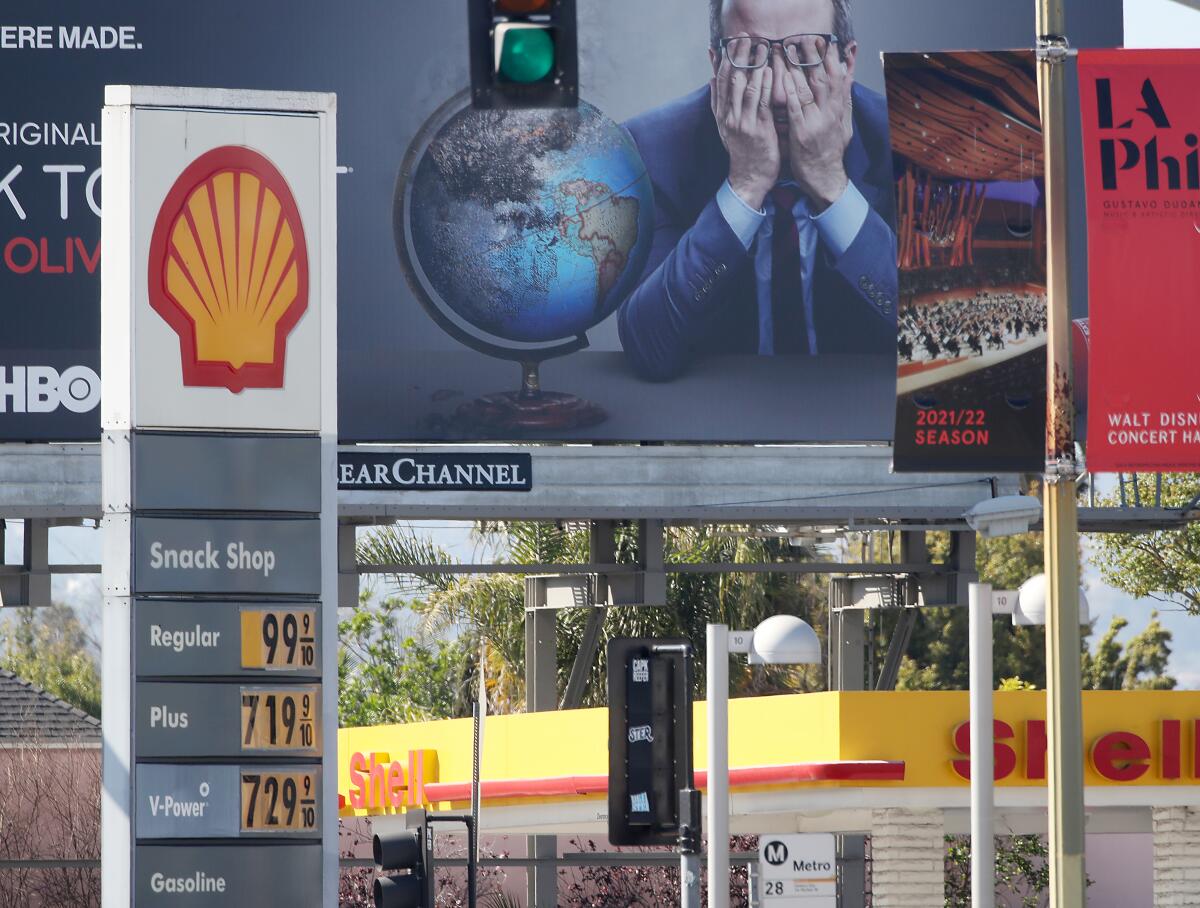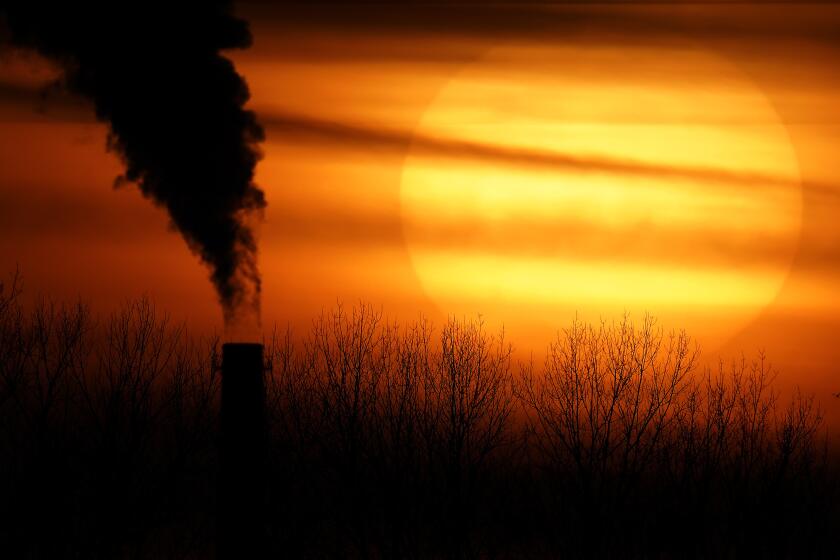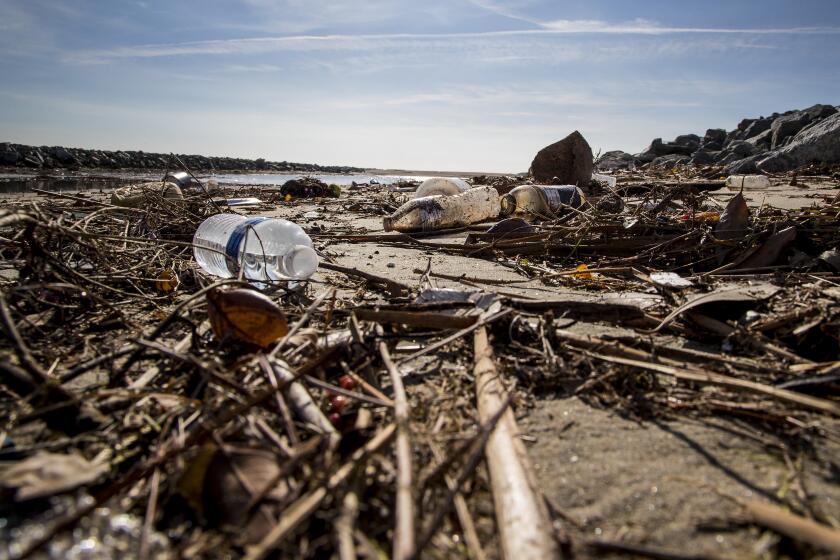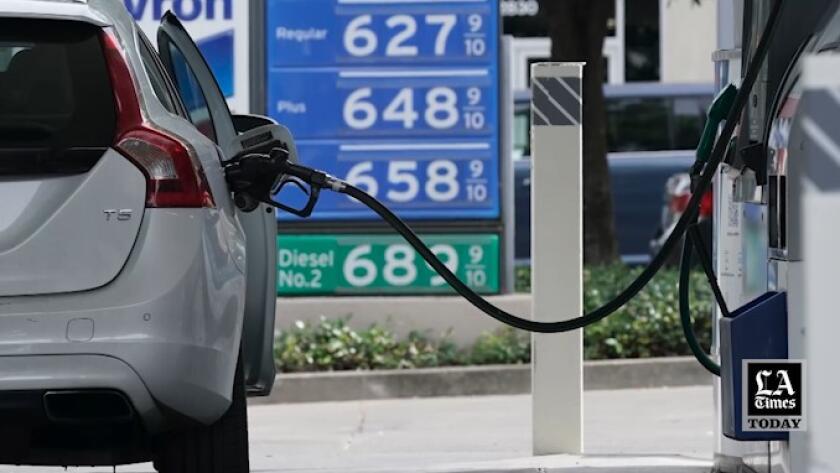Ban new gas stations? There are better ways for L.A. to ditch fossil fuels

- Share via
Should Los Angeles join a handful of Bay Area cities that have banned new gas stations?
At first glance, the idea proposed by Councilman Paul Koretz sounds like a logical step. To avoid disastrous climate change, we need to stop building new fossil fuel infrastructure. That means enacting policies to swiftly replace gas and diesel-guzzling vehicles with zero-emission models, but also doing much more to support the widespread and equitable deployment of charging stations as the number of electric vehicles on the road climbs. And with California poised to phase out sales of gas-powered cars by 2035, it seems foolish to keep building more fueling stations, especially in a city that is already saturated with them.
But stopping the building of new gas, diesel or other fossil-fuel pumps in the city would have little real effect and should not be a top priority of city leaders, who have more effective actions they can take to accelerate the switch to electric cars and make planet-endangering fossil fuels a thing of the past.
Koretz, who is running for city controller, was inspired by the actions the city of Petaluma, north of San Francisco, which last year approved what was described as the nation’s first prohibition on the construction of new gas stations. Other cities, including Rohnert Park and Sebastopol in Sonoma County, have since adopted similar bans, and a coalition of environmental groups and local government officials have mounted a campaign to replicate the policy across California and the nation. But Koretz’s May 2021 motion to draft an ordinance barring new gas stations in Los Angeles is still awaiting a hearing. Fossil fuel interests have predictably vowed to opposed any such move by Los Angeles, and some have criticized it as nothing but a symbolic ploy.
The world should be racing to prevent the worst impacts of global warming, yet the Supreme Court just made it harder for the U.S. to cut carbon emissions from power plants.
Though it would be more than symbolic, recent data indicate any changes would be modest. Only eight permits for new gasoline or natural gas fueling stations or pumps were issued from 2016 to summer 2021, according to information provided to Koretz’s office by the Department of Building and Safety. Most of the recently issued permits are in South L.A., including at 7-Eleven, Shell, Sinclair and World Oil locations, but also at a Costco in Pacoima and other businesses in the San Fernando Valley.
To be clear, there are good reasons to end construction of new gas stations, which, beyond fueling climate change, also have a tendency to become costly environmental cleanup sites themselves. The underground storage tanks they use can contaminate soil and groundwater and pose risks to drinking water supplies for years after they close. A statewide 2021 assessment by the State Water Resources Control Board found 136 improperly abandoned underground fuel storage tank facilities, many of them old gas stations, including a dozen in disadvantaged communities and within 1,000 feet of a municipal water supply well.
Prohibition or not, the market for new gas stations is bound to shrink anyway, as demand for gasoline decreases through the state’s evolving zero-emission vehicle mandates and as electric cars become more price competitive with gas-fueled models. There is no doubt the state’s end goal, at least for automobiles, is the elimination of planet-warming fossil fuels and the infrastructure that supports them. The state Air Resources Board’s new testing facility in Riverside, after all, features a sculpture of a fossilized gas station — a not-so-subtle symbol of the future California regulators are pursuing.
Editorial: California has a chance to lead the nation on cutting plastic trash. If we don’t blow it
Environmentalists and industry representatives have hammered out a deal for the most significant single-use plastic legislation in the nation. But it has only a week to pass both houses of the state Legislature.
A well-crafted prohibition on new gas stations could be a small part of Los Angeles’ climate agenda, so long as it doesn’t undermine economic and neighborhood development. But it should be a far lower priority than, say, electrifying the city’s homes, buildings and transportation system and ending oil drilling. It’s awful that wells continue to operate next to homes and schools and endanger people’s health in low-income communities of color (and state officials are still approving new wells).
Far more important and deserving of attention and resources are measures to speed up expansion of L.A.’s vehicle charging network and other measures that will smooth the transition to electric cars. We need stronger rules and programs that focus on low-income communities and apartment dwellers who face more economic and logistical barriers to adopting zero-emission vehicles.
The city has taken good steps in recent years, including updating its building code to increase the number of car chargers and electric vehicle parking spaces in new construction and launching an electric vehicle master plan that will include a road map for electrifying the city’s entire fleet of more than 10,000 vehicles and deploying more public charging stations, among other actions. But officials can do much more. Ultimately, Los Angeles’ success will depend more on focusing efforts to make streets friendly to electric vehicles, public transportation, walking and biking than on halting development of new gas stations.
- Share via
Watch L.A. Times Today at 7 p.m. on Spectrum News 1 on Channel 1 or live stream on the Spectrum News App. Palos Verdes Peninsula and Orange County viewers can watch on Cox Systems on channel 99.
More to Read
A cure for the common opinion
Get thought-provoking perspectives with our weekly newsletter.
You may occasionally receive promotional content from the Los Angeles Times.












